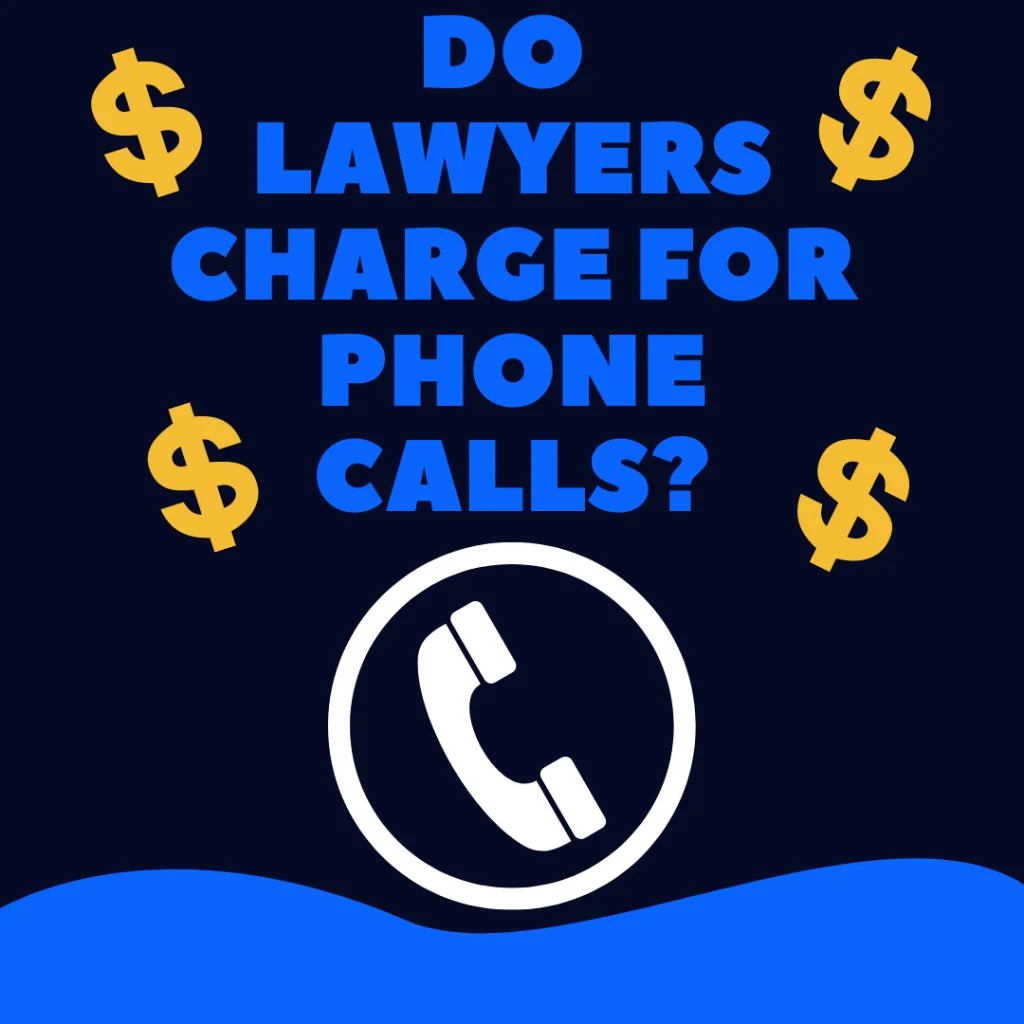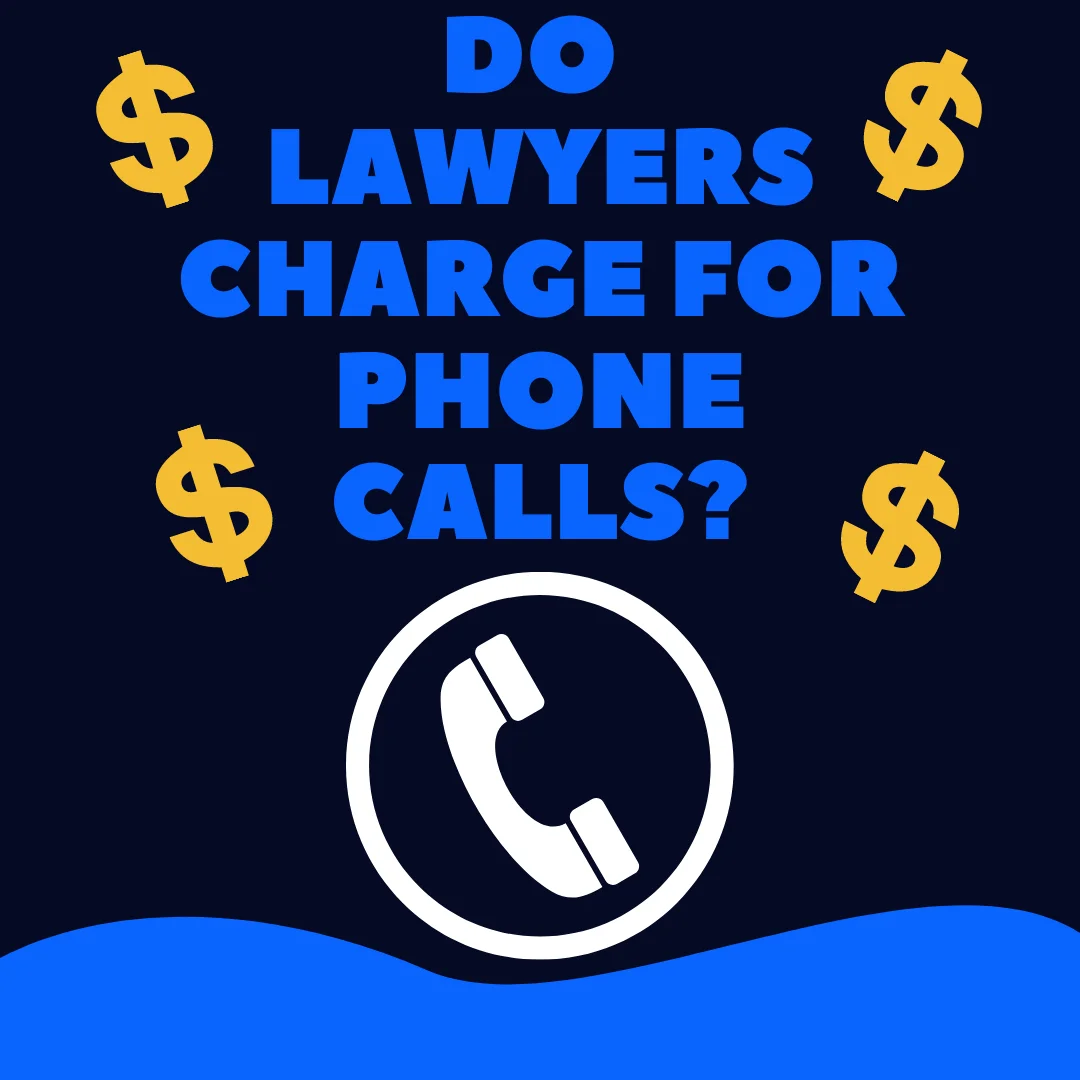Yes, lawyers charge clients for phone calls.
But not always.
Let us explain.
When Do Lawyers Charge For Phone Calls? (EXPLAINED)
Disclaimer
The contents of this web page are for informational purposes only, and nothing you read is intended to be legal advice. Please review our disclaimer about law/legal-related information on this website before taking action based upon anything you read or see.
Per The Attorney and Client Agreement
Lawyers charge their clients for his services (and the assistance of his staff) when an agreement between the attorney and client has been reached.
In most cases, that agreement is reduced to writing, signed by both the parties.
Sometimes the agreement is very extensive, and specifically lays out all of the types of work that an attorney can charge the client for, such as court appearances, document drafting, or even sending emails.
Sometimes the agreement is not very explicit, and states generally that attorney will do “work” for or on behalf of the client.
But even when there isn’t a written agreement, so long as there has been an attorney-client relationship established on an hourly basis, the attorney can charge the client for phone calls, so long as the phone calls are associated with the case.
Hourly Arrangement vs Contingent/Flat Fee Arrangement
There are some attorney-client fee arrangements when the attorney will not charge the client for phone calls.
When the attorney has been hired on an hourly basis, the client pays the attorney for every task, as separately and individually billed.
When the attorney has been hired on a contingent basis, the attorney is paid out a percentage of the recovery at the conclusion of the case, and individual phone calls are not specifically charged to the client.
When the attorney has been hired on a flat fee, the attorney is paid a set lump sum up front, and the client is not charged for specific tasks like phone calls, as all attorney’s fees are considered to be already paid for.
Reasonable vs Unreasonable Fees
In most states and jurisdictions, to avoid discipline, attorneys can only charge their clients reasonable fees.
If the charge for the phone call is not a reasonable one (meaning the phone call was unreasonably long, not related to the case, or was to help the attorney with a task that the attorney should not charge the client for), then the phone call should not be charged to the client.
Do Attorneys Always Charge Their Clients For Phone Calls?
Attorneys regularly “no charge” or “credit” their clients’ bills.
Attorneys know and understand that clients like to see some of their money returned, or to get a ‘deal.’
Phone calls and emails are tasks that attorneys will sometimes “no charge” to their clients, leaving the charge on the bill with the credit so that the client can clearly see how much money was saved by the client.
Attorneys also regularly perform work for their clients that they don’t bill their clients for, that their clients never even know about.
Clients don’t realize sometimes how much work a case really takes, but attorneys do.
Attorneys usually want to help their clients, and they don’t want their client’s retainer to run out quite so fast.
To do their best for their client, they’ll often do things like make phone calls or work on the file and not bill the client for it.
And some attorneys just don’t believe that phone calls should all be billed.
But in general, even if the attorney doesn’t want to bill the client, if the work (meaning the call) was on behalf of the client and for the client and falls within the agreed upon services, the attorney can bill the client.
How Much Do Attorneys Charge Their Client’s For Phone Calls?
Attorneys can charge their clients per their fee agreement.
Many fee agreements have a .1 (6 minute) minimum charge.
Other fee agreements have a .3 (18 minute) minimum charge.
If the call is short, only two minutes, the attorney could charge the client the minimum (.1 or .3 or whatever it is).
And this is fully acceptable pursuant to the fee agreement (signed by the client) as well as the local bar association.
Attorneys may also just use a timer, and charge their clients for the actual time spent, the two minutes.
If the call is longer than the minimum, usually the call is rounded up to the nearest tenth (.5, .6, .7 of an hour).
Many clients do not realize how expensive it is to talk to their attorney until they receive their first billing statement from the attorney.
Then they’ll call in as little as possible.
What If My Lawyer Is Overcharging You For Phone Calls?
If you think that the charges on your bill for phone calls is unreasonable, you may need to take action pretty quickly.
In most cases, there’s a clause in your fee agreement that states that if you do not object to the charges on your bill within a certain amount of time (10 days, 30 days, etc), then you accept that the charges are reasonable.
The best place to start is by contacting your attorney to talk about the billing.
In most cases, attorneys are not allowed to charge their clients when discussing billing disputes.
If the billing dispute cannot be resolved, you should consider contacting the bar association in your jurisdiction to initial fee dispute litigation.
In many cases, if you show the attorney that you are serious about disputing the bill, they’ll come to the table to try and resolve the matter so that they don’t spend any more time on the matter, which could be spent on another case and earning another dollar.
Wrap Up
Clients who are paying their attorneys on an hourly basis should assume that every action taken by the lawyer on the case (emails, calls, writing, talking, conferences) is billable time and that the client will be charged for it.
If the client does not help, he can try and see if the lawyer’s secretary, executive assistant, or paralegal can help.
These individuals still charge the client for their time, but the hourly rate is usually much less.
This mentality and mindset should help the client maximize the use of their initial retainer deposit.
Wrap Up
Does it make it a better justice system when all the judges are former prosecutors? That’s another question entirely.
Want to learn more about your criminal justice system?
Browse our free legal library guides for more information.
You might also like:
- What Happens When a Lawyer Loses a Case?
- What Are The Differences Between Prosecutors and Attorneys?
- Is Bankruptcy a Criminal Offense?
- Can You Change Your Will Without An Attorney?
- Is It Illegal To Change Lanes In An Intersection In Alabama?
- What Happens When a Plaintiff No-Shows?
- Can a Prosecutor Become a Judge?
- Do All Felony Cases Go To Trial?
- Can You Legally Disown a Child?


